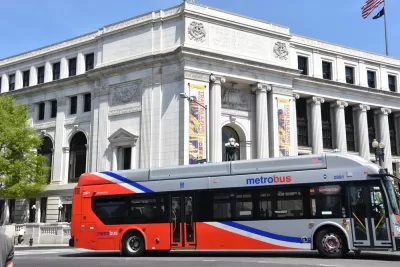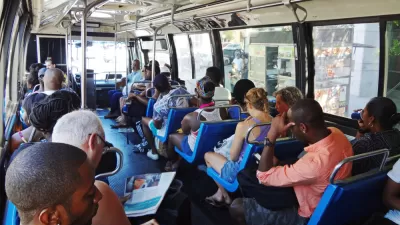Bus ridership is down in the nation's capital. Some see the issue as an opportunity to better design the service to make dollars go further.

Some officials hope to borrow lessons from Houston's redesign of its bus service to try to turn around falling ridership numbers. "It’s a strategy that is being pushed by the Washington region’s leaders, eager to see Metro seize opportunities to save money and 'right-size' service — essentially, to eliminate buses that consistently fail to run at capacity. A bus network overhaul was among the ideas recommended by former U.S. Transportation Secretary, Ray LaHood, in his recently released report on how to fix Metro’s structural and financial problems," Martine Powers writes for the Washington Post.
Why buses in D.C. are losing riders is a subject of debate, some say that now-completed train projects make that service more attractive, others point to lifestyle changes taking more people away for 9-to-5 schedules that the system was built around, and the growth of bike-share and ride-share are likely part of the equation as well.
In Houston, "officials focused on providing more frequent service throughout the day rather than clustering their efforts around the morning and evening peak periods," Powers writes. The system also moved away from a hub-and-spoke system to a grid system. "The effects on ridership are heartening: in the first year after the redesign, Saturday ridership increased by 15 percent, and Sunday service was even more popular." But some paint a less rosy picture of Houston's update, arguing that the city sacrificed equity when it cut service to areas with less ridership, which were often poor and minority.
The Houston bus redesign didn't end up saving the city money, but backers argue that boosting ridership on buses is a lot cheaper than adding transit services by any other means. They contend that, while costs went up, those dollars go further when they're spent on bus transit.

Planetizen Federal Action Tracker
A weekly monitor of how Trump’s orders and actions are impacting planners and planning in America.

Congressman Proposes Bill to Rename DC Metro “Trump Train”
The Make Autorail Great Again Act would withhold federal funding to the system until the Washington Metropolitan Area Transit Authority (WMATA), rebrands as the Washington Metropolitan Authority for Greater Access (WMAGA).

The Simple Legislative Tool Transforming Vacant Downtowns
In California, Michigan and Georgia, an easy win is bringing dollars — and delight — back to city centers.

The States Losing Rural Delivery Rooms at an Alarming Pace
In some states, as few as 9% of rural hospitals still deliver babies. As a result, rising pre-term births, no adequate pre-term care and "harrowing" close calls are a growing reality.

The Small South Asian Republic Going all in on EVs
Thanks to one simple policy change less than five years ago, 65% of new cars in this Himalayan country are now electric.

DC Backpedals on Bike Lane Protection, Swaps Barriers for Paint
Citing aesthetic concerns, the city is removing the concrete barriers and flexposts that once separated Arizona Avenue cyclists from motor vehicles.
Urban Design for Planners 1: Software Tools
This six-course series explores essential urban design concepts using open source software and equips planners with the tools they need to participate fully in the urban design process.
Planning for Universal Design
Learn the tools for implementing Universal Design in planning regulations.
Smith Gee Studio
City of Charlotte
City of Camden Redevelopment Agency
City of Astoria
Transportation Research & Education Center (TREC) at Portland State University
US High Speed Rail Association
City of Camden Redevelopment Agency
Municipality of Princeton (NJ)




























